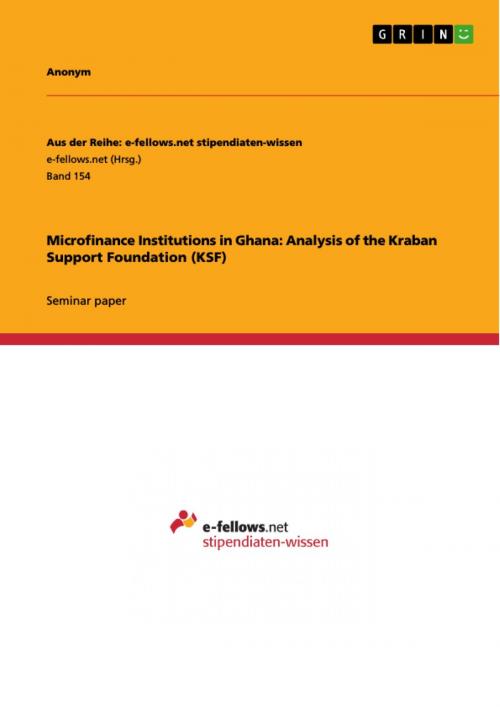Microfinance Institutions in Ghana: Analysis of the Kraban Support Foundation (KSF)
Business & Finance, Finance & Investing, Finance| Author: | Anonymous | ISBN: | 9783640974399 |
| Publisher: | GRIN Publishing | Publication: | August 3, 2011 |
| Imprint: | GRIN Publishing | Language: | English |
| Author: | Anonymous |
| ISBN: | 9783640974399 |
| Publisher: | GRIN Publishing |
| Publication: | August 3, 2011 |
| Imprint: | GRIN Publishing |
| Language: | English |
Seminar paper from the year 2011 in the subject Economics - Finance, grade: 1,33, IE Business School, Madrid, language: English, abstract: Although not as widespread and developed as in Latin America and Asia, microfinance in Africa has become a central tool for alleviating poverty and spurring economic development. With a financial sector that in regional comparison is already fairly well developed, Ghana's microfinance sector is one of the most vibrant of the continent. Mixmarket (2011) lists $131.2 million of total loans, distributed among 358,717 active borrowers, for 2009. For the same year, 1.3 million private lenders are estimated to hold in total $140.2 million in deposits in Ghana. This report examines the microfinance institution (MFI) 'Kraban Support Foundation' (KSF). This small organization, founded in 1996, serves as a case study for applying microfinance-adjusted analytical assessment tools. This is done from the perspective of a potential investor or donor of funds. The report is structured the following: First, we will give a brief overview of the microfinance operational environment in Ghana to lay the basis for the analysis. Secondly, we will present KSF with its history, mission, and current situation. This qualitative assessment will then be furthered by applying the 'CAMEL' methodology which is tailored to microfinance institutions. By looking at capital adequacy, asset quality, management, earnings, and liquidity risk, we aim at providing a comprehensive picture of the MFI's health despite the very limited data available. Furthermore, we attempt to complement the analysis by using Accion's Social Indicators as far as information about KSF could be obtained. In a concluding summary, we will state which results the assessment yielded, and more importantly, what our investment decision as prospective investor or donor would be.
Seminar paper from the year 2011 in the subject Economics - Finance, grade: 1,33, IE Business School, Madrid, language: English, abstract: Although not as widespread and developed as in Latin America and Asia, microfinance in Africa has become a central tool for alleviating poverty and spurring economic development. With a financial sector that in regional comparison is already fairly well developed, Ghana's microfinance sector is one of the most vibrant of the continent. Mixmarket (2011) lists $131.2 million of total loans, distributed among 358,717 active borrowers, for 2009. For the same year, 1.3 million private lenders are estimated to hold in total $140.2 million in deposits in Ghana. This report examines the microfinance institution (MFI) 'Kraban Support Foundation' (KSF). This small organization, founded in 1996, serves as a case study for applying microfinance-adjusted analytical assessment tools. This is done from the perspective of a potential investor or donor of funds. The report is structured the following: First, we will give a brief overview of the microfinance operational environment in Ghana to lay the basis for the analysis. Secondly, we will present KSF with its history, mission, and current situation. This qualitative assessment will then be furthered by applying the 'CAMEL' methodology which is tailored to microfinance institutions. By looking at capital adequacy, asset quality, management, earnings, and liquidity risk, we aim at providing a comprehensive picture of the MFI's health despite the very limited data available. Furthermore, we attempt to complement the analysis by using Accion's Social Indicators as far as information about KSF could be obtained. In a concluding summary, we will state which results the assessment yielded, and more importantly, what our investment decision as prospective investor or donor would be.















